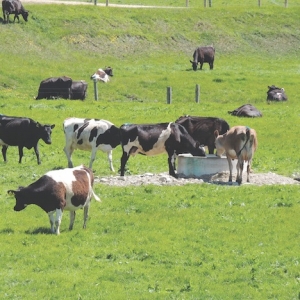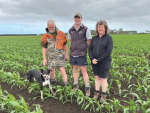MENTION WATER quality and the topics that spring to mind are run-off, leaching and the state of our lakes and rivers, but for livestock farmers animal health should be up there too, says a Feilding nutritionist.
Even if you’ve never had a clinical problem pinpointed to water, it’s probable that less-than-pristine troughs and ponds are having a sub-clinical impact on your stock’s productivity, says Lucy Waldron of LWT Animal Nutrition.
“There are major issues with blue-green algae every summer,” she told Rural News. “Media reports generally focus on paralysis and deaths among dogs and human health but the blooms produce a range of neurotoxins that will affect all animals consuming contaminated water.”
She concedes she now has a commercial interest in highlighting the problem but a mass of published papers worldwide document cases and causes of such blooms, which are generally bacterial rather than algal.
While most focus on risk and incidences in human water supplies, there are several references to stock problems, such as Faulkner and Humpage in a 2005 edition of the International Journal of Environmental Research and Public Health. “The massive waterbloom of Anabaena circinalis on 1000km of the Darling River in Australia in 1991 killed a large number of sheep and cattle,” they note.
Waldron says in New Zealand, water troughs which often have little or no flow for weeks are an ideal environment for such blooms to develop, particularly where there are rough concrete surfaces.
A pilot survey by LWT on a well-run dairy farm found troughs contaminated with campylobacter and pseudomonas bacteria, as well as aphanocapsa, phormidium and pseudanabaena toxic algae.
“Exposure to such water-borne pathogenic bacteria can cause gastric disorders and other diseases, impacting on profitability due to reduced milk production and increased mastitis, calf scours and mortality.”
There’s also the risk of milk contamination, resulting in downgrade penalties or even rejection, she points out.
In another pilot survey, LWT treated dams visually affected by blue-green growths with the Credence water sanitiser it is now marketing. The result was 80% were kept clean for at least a year. “This was dependent on the water flow in and out and we’ll be doing new trials on this.”
Landholders with groundwater supplies shouldn’t think they’re immune to problems, as rising nutrient content in groundwater in many regions means bore water may develop blooms too, once it has had a chance to warm, Waldron adds. “Bore holes are a major problem due to high levels of N entering ground water now, which encourages pathogens such as Clostridia to grow rapidly…. All farm animals grazing with access to troughs and dams are potentially at risk.”
Meanwhile many studies of water off roofs show such sources are also frequently contaminated.
Waldron says the Credence tablets will be available through vet practices and rural retailers and should cost no more than $1.50 each. Each tablet will treat 1000L to drinking water standard.
“That compares to about $3.40 for copper sulphate blocks which typically only treat 1000 litres and have been associated with mineral overload problems, particularly in sheep, and a toxin burst from the algae before they’re killed off.”
Credence tablets can also be used in a more concentrated solution as a disinfectant which, once rinsed and diluted, poses no risk to stock. “This is particularly useful for calf rearing, for washing down pens, troughs, and cleaning teats.”



















